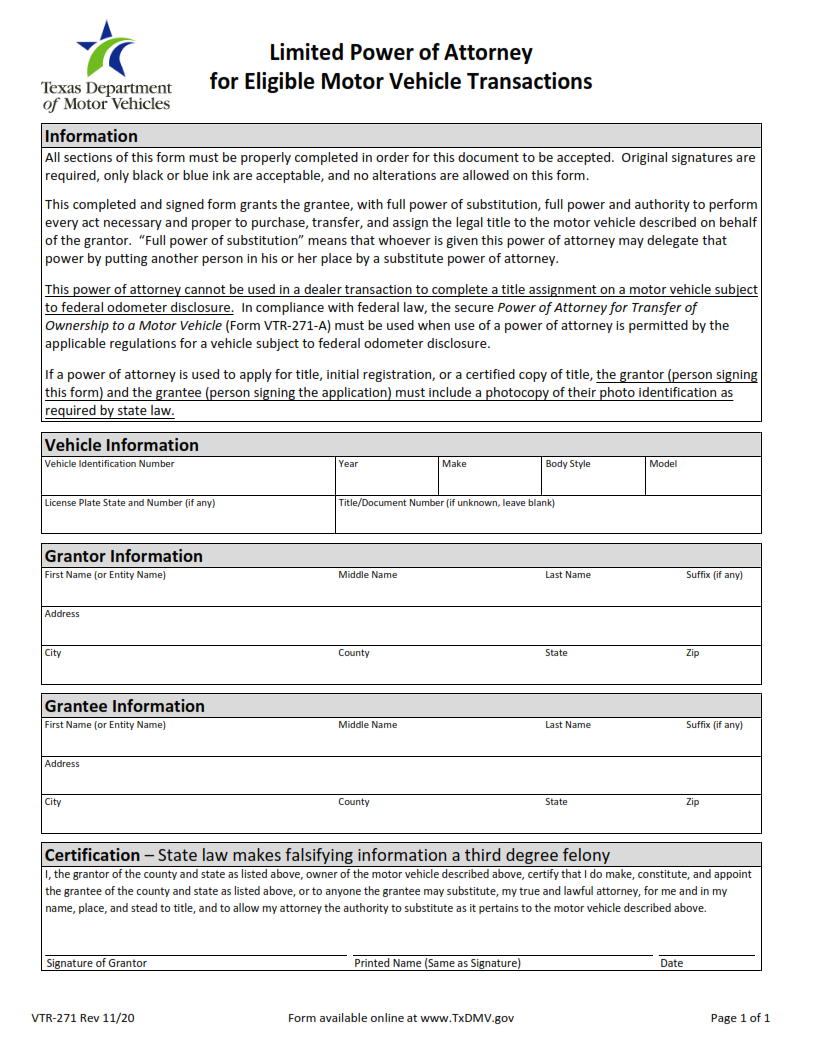ORIGINFORMSTUDIO.COM – VTR-271 – Limited Power of Attorney for Eligible Motor Vehicle Transactions – The VTR-271 – Limited Power of Attorney for Eligible Motor Vehicle Transactions is an important document to have in order to give someone else the legal authority to act on your behalf. It can be a useful tool when one needs another person or company to take care of administrative transactions or paperwork that would otherwise require the owner’s presence or signature. This document is particularly relevant when dealing with motor vehicles, as it grants authority over certain vehicle transactions without having to go through the hassle of transferring ownership.
Download VTR-271 – Limited Power of Attorney for Eligible Motor Vehicle Transactions
| Form Number | VTR-271 |
| Form Title | Limited Power of Attorney for Eligible Motor Vehicle Transactions |
| File Size | 1 MB |
| Form By | Texas DMV Form |
What is a VTR-271 Form?
The VTR-271 is a form used by the Texas Department of Motor Vehicles (TxDMV). It authorizes an individual or entity to conduct certain motor vehicle transactions on behalf of another person. The form is also referred to as the “Limited Power of Attorney for Eligible Motor Vehicle Transactions”.
The purpose of the VTR-271 form is to assign an agent the authority to perform a variety of transactions related to motor vehicle titles and registration renewals. This could include transferring ownership, removing liens, processing refunds or exchanging license plates. The authorized agent must have written permission from the owner in order to complete any transaction. All information provided on the form must be accurate and current, otherwise, it may result in delays or denial of services by TxDMV.
What is the Purpose of the VTR-271 Form?
The VTR-271 form, or the Limited Power of Attorney for Eligible Motor Vehicle Transactions, is a document used to authorize someone else to act on behalf of the owner in certain motor vehicle transactions. It is an important document that allows individuals and businesses to delegate authority over their vehicles when they are unavailable or unable to complete the transactions themselves.
The purpose of this form is to provide proof of authorization when another person completes a motor vehicle transaction with the Texas Department of Motor Vehicles (TxDMV). The VTR-271 can be used for various eligible transactions such as registering, titling, transferring ownership, and more. When completing these activities on behalf of someone else, it must be accompanied by this form in order for the TxDMV to accept them.
Where Can I Find a VTR-271 Form?
The VTR-271 is a Texas-specific form that allows an individual to designate another person to act on their behalf for certain types of motor vehicle transactions. The form is available from the Texas Department of Motor Vehicles (TxDMV).
Individuals can access the VTR-271 directly from the TxDMV website. The form can be downloaded and printed out for easy completion. In addition, individuals may request a printed copy of the VTR-271 from the TxDMV by mail or phone. Once completed, individuals should submit the form with supporting documents to one of TxDMV’s County Tax Assessor-Collectors offices or local Vehicle Titles and Registration Division office.
VTR-271 – Limited Power of Attorney for Eligible Motor Vehicle Transactions
The Texas Department of Motor Vehicles (TxDMV) has created a form called VTR-271, which allows an individual to grant limited power of attorney for certain motor vehicle transactions. This form is used when an individual needs someone else to act on their behalf in the sale or transfer of ownership of a motor vehicle. The person granting the power must be present at the TxDMV office with proper identification and sign the document in front of an authorized representative.
The form can also be used to authorize someone else to register a vehicle and obtain license plates. The individual must provide proof that they are the owner or have authority over the motor vehicle being registered, as well as proof of liability insurance for the vehicle. They must also provide any other documentation required by law, such as title applications or odometer statements.
VTR-271 Form Example
